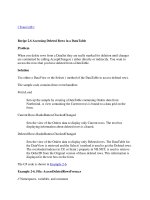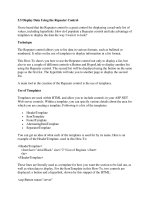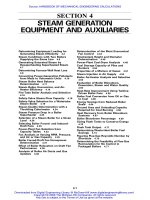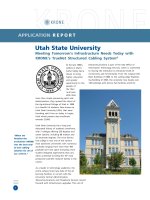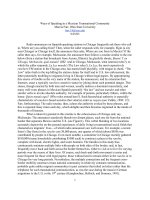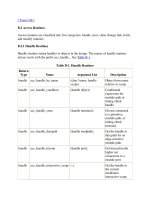Tài liệu Application of Computers in Process Control pptx
Bạn đang xem bản rút gọn của tài liệu. Xem và tải ngay bản đầy đủ của tài liệu tại đây (527.86 KB, 7 trang )
Page 1 of 7
ECET- 462
Application of Computers in Process Control
Purdue University, Calumet
[LABORATORY 8]
Tuning of a PID controller using Ziegler-Nichols Method
Page 2 of 7
Tuning of a PID controller using Ziegler-Nichols Method
LAB 8
Objective:
1) To demonstrate the use of PID controller using LabVIEW.
2) Finding the values of K
P
and T
I
and T
D
using Ziegler Nichols Method for Tuning the PID
controller
Software required: LabVIEW
Background:
PID controllers are probably the most commonly used controller structures in industry. They do,
however, present some challenges to control and instrumentation engineers in the aspect of
tuning of the gains required for stability and good transient performance. There are several
prescriptive rules used in PID tuning. An example is that proposed by Ziegler and Nichols in the
1940's and described in this note.
The PID controller encapsulates three of the most important controller structures in a single
package. The parallel form of a PID controller has transfer function:
where:
Kp := Proportional Gain
KI := Integral Gain TI := Reset Time =Kp/Ki
Kd :=Derivative gain Td := Rate time or derivative time
Parallel Form of the PID Compensator
Page 3 of 7
The proportional term in the controller generally helps in establishing system stability and
improving the transient response while the derivative term is often used when it is necessary to
improve the closed loop response speed even further. Conceptually the effect of the derivative
term is to feed information on the rate of change of the measured variable into the controller
action. The most important term in the controller is the integrator term that introduces a pole at s
= 0 in the forward loop of the process. This makes the compensated open loop system (i.e.
original system plus PID controller) a type 1 system at least; our knowledge of steady state errors
tells us that such systems are required for perfect steady state setpoint tracking.
Ziegler-Nichols Tuning
In 1942 Ziegler and Nichols, both employees of Taylor Instruments, described simple
mathematical procedures for tuning PID controllers. These procedures are now accepted as
standard in control systems practice. Ziegler-Nichols formulae for specifying the controllers are
based on plant step responses.
Steps to determine PID controller parameters:
1. Reduce the integrator and derivative gains to 0.
2. Increase Kp from 0 to some critical value Kp=Kc at which sustained oscillations occur
3. Note the value Kc and the corresponding period of sustained oscillation, Tc
4. The controller gains are now specified as follows:
PID Type
K
P
T
I
T
d
P
0.5Kc
Inf
0
PI
0.45Kc
Tc/1.2
0
PID
0.6Kc
Tc/2
Tc/8
Consider a process with transfer function:
Let us consider that the overall system has a unity feedback.
Page 4 of 7
Changes in system’s closed loop response because of the changes in PID parameters with respect
to a step input can be best described using the following chart:
In LabVIEW there are several PID controller modules. We shall use the Academic PID
controller. The difference between different PID controllers is shown below:
Page 5 of 7
Program:
Page 6 of 7
Page 7 of 7
Conclusion:
1) Follow the steps describe above to tune the PID controller.
2) Find the values of K
P
, T
I
, T
D.
3) What is the effect of changing the PID controller parameters in the step response of the
overall system?
4) Note the Time response parametric data after the controller is tuned.
Ref:
The Design of PID Controllers using Ziegler Nichols Tuning Brian R Copeland; March, 2008
